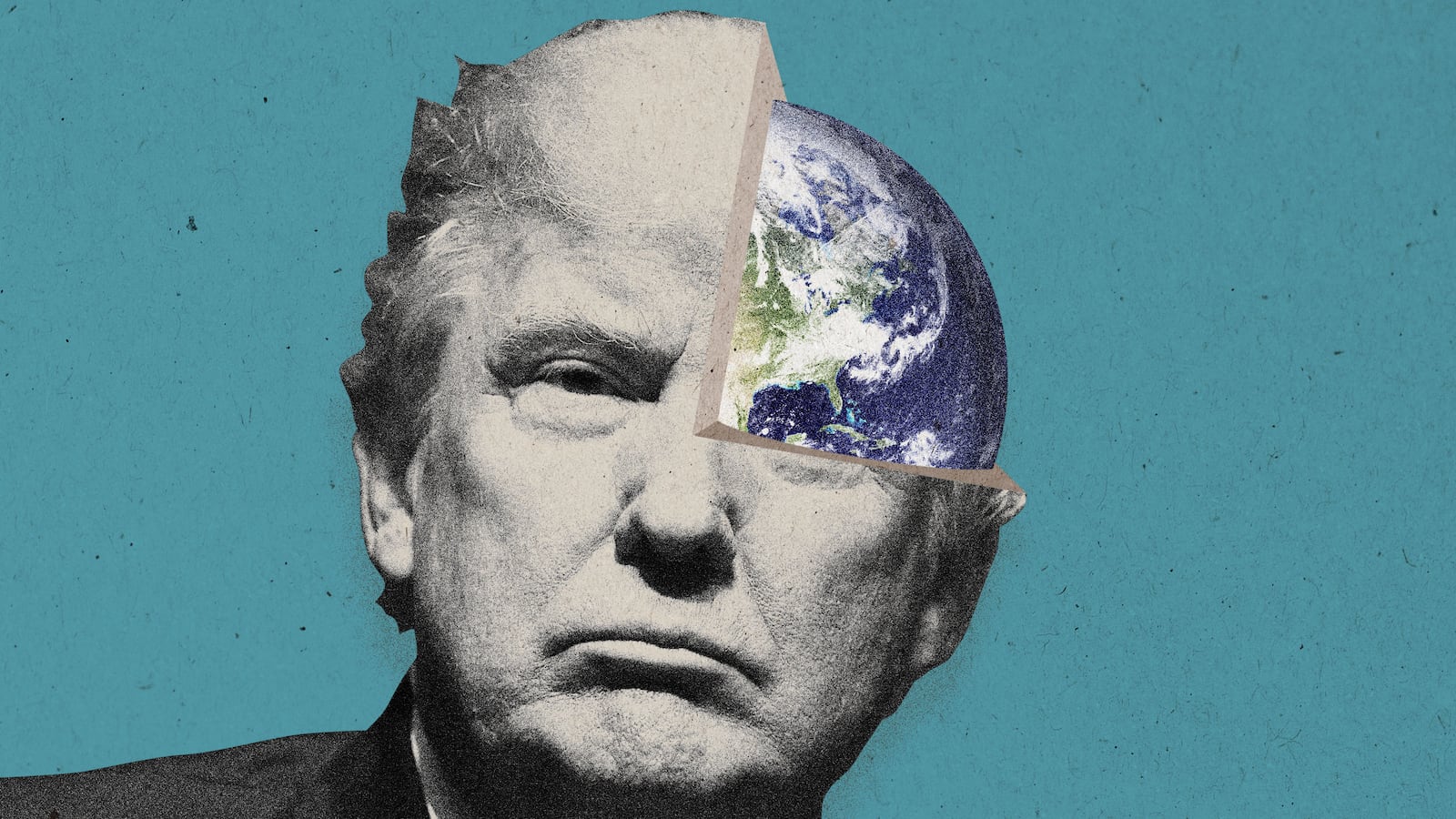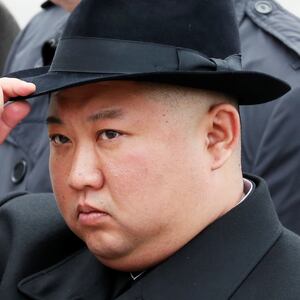PARIS—When it comes to foreign policy, the best thing about Donald J. Trump is his distaste for wars. He really does not want to continue old unresolved ones, much less launch new ones. Unfortunately, that’s in direct contradiction with his macho MAGA muscle-flexing.
His answer: money. Trump's core belief appears to be that he can weaponize the dollar, putting sanctions on those he declares enemies, then sanctioning as well anybody around the world who doesn’t cooperate, squeezing them until they give up.
In Trump's view, the U.S. is so rich that the world has to play along. The weaponized dollar and sanctions should make it unnecessary to put boots on the ground in Venezuela, say, or Iran. Against stronger powers that Trump has declared as adversaries, like China and even Canada and Europe, the dollar weapon takes the form of tariffs and trade wars.
Certainly American economic power should not be underestimated. Trump is looking at a world where half of all global currency reserves and trade is in U.S. dollars. You can’t really get around that. American laws are set up to punish anyone anywhere who cuts deals in dollars that bypass sanctions, and the penalties imposed can be enormous. The Obama administration set a precedent in 2014 when the French bank BNP Paribas was forced to pay a $9 billion fine for violating sanctions against Sudan, Cuba, and Iran.
But what we’ve seen over the last few days is increasing defiance from leaders of the countries Trump has targeted most aggressively, and the administration seems confused as a result.
Those regimes' finances, businesses, and masses of their people may suffer, but even Venezuela’s ruinously incompetent President Nicolás Maduro has held on for now, Iran’s ayatollahs aren’t going anywhere any time soon, and neither Trump’s sanctions nor his professions of love have inspired North Korea’s Kim Jong Un to sacrifice his hard-won nukes.
As for China’s Xi Jinping, Trump is now demanding he bend the knee in the escalating trade war as the Americans up the ante dramatically with tariffs on $200 billion worth of imports that went into effect overnight from Thursday to Friday. Talks continue, but for the globally ambitious Xi surrender would mean a disastrous loss of face that he will want to avoid at all costs.
The obvious response for hard-pressed regimes, none of which have economic weapons that can begin to match the dollar, is to use weapons of a more conventional variety. And as they realize that Trump has very little taste for any measures that deploy American troops for combat, they are tempted to push him toward military action he does not want to take—or a retreat he doesn’t want to make.
On every front, we see Trump being tested by carefully calculated measures that nudge but do not necessarily cross his red lines: Maduro arrests the No. 2 of the U.S.-backed challenger to his regime; Iran positions its proxies to be able to attack U.S. forces in Iraq, even as it declares it will start stockpiling nuclear materials again; Kim Jong Un starts launching short and medium-range missiles—which may also be a ploy endorsed by China to show how much Trump needs Xi’s help on the Korean Peninsula.
Into this muddled picture come Trump advisers who have grand plans of their own and think they’ve got a grip on big-picture geopolitics.
In a rare speech this week, Trump’s former National Security Adviser H.R. McMaster warned without naming names that today some in the president’s circle “are not there to give the president options—they’re there to try to manipulate the situation based on their own agenda, not the president’s agenda.”
None more clearly fit that description than National Security Adviser John Bolton, who seems to be supported by Secretary of State Mike Pompeo. They offer variations on what used to be called “the third way” to confront hostile regimes when sanctions fall short: complicated conspiracies, covert plots, and demonstrations of resolve in one part of the world that may be intended for impact on the other side of the globe entirely.
We’ve seen this stuff before. In the Reagan years, it led to the feckless bombing of Syria and Libya, the mining of Nicaragua’s harbors, and the ugly, complicated, self-contradicting policies that eventually fell under the rubric Iran-Contra. One notes that Elliott Abrams, who lied twice to Congress to cover up aspects of that affair, is now Trump’s special envoy dealing with Venezuela.
When sanctions, covert actions, and conspiracies fail, the next step in the U.S. program of international coercion usually is the use of air power and standoff weapons like cruise missiles. The presidents who followed Reagan added drones and cyberweapons to their arsenals, and Trump clearly loves his Reapers, vaporizing suspected terrorists around the world.
But in point of fact, when a regime’s survival is threatened and it girds for the worst, boots on the ground are the only sure way to make sure it goes down. And experience in Afghanistan and Iraq has shown how hard it is to walk away from such wars once they are begun, even after a president declares “mission accomplished.”
Trump can see what a slippery slope lies ahead if the deadly dollar doesn’t finish off his adversaries. He probably knows as well the rhetoric of “fire and fury” and talk about military options “on the table” can go only so far without the risk they have to be backed up.
The wild card in all this, as in so much that touches the Trump administration, is Russia. Since the government of President Vladimir Putin summarily annexed Ukraine’s Crimean Peninsula and launched a separatist war against Kiev in 2014, it has faced severe U.S. sanctions. And after its role was exposed subverting American democracy by supporting Trump’s presidential campaign in 2016, Congress rammed through even tougher measures, which Trump reluctantly signed.
Putin wants all those sanctions lifted, or at least lightened, and Trump, for whatever reasons, has always hoped and believed that Putin is the partner who can help him solve the world’s problems. The only obstacle, in Trump’s oft-stated opinion, has been the Mueller investigation into Putin’s election interference.
With Trump now claiming, erroneously but insistently, that he’s been totally exonerated by the Mueller Report, it appears both he and Putin think they can put their relationship on a new and friendlier footing.
In Trump’s hour-long phone call with Putin, both men supposedly dismissed what Trump called “the Russian hoax.” But according to readouts from the Kremlin as well as the White House, they also touched on Venezuela, Iran, and North Korea. What might have been agreed is unclear.
The Russian, of course, has his own designs.
Venezuela is likely to be the most interesting and immediate test case for Russian cooperation.
Since January—when Juan Guaidó declared himself president and challenged Maduro with U.S. backing—Trump and his hawkish advisers have portrayed the downfall of Maduro not only as a benefit to the people of Venezuela, but a cautionary example for Iran. “Different dictators. Same results,” Pompeo crowed in a tweet with pictures of Maduro, the Iranian leadership, and Raul Castro in Cuba.
But as the end of April rolled around, Maduro was still there.
On April 29, according to NBC News, Bolton convened a top-secret meeting of senior U.S. officials at the headquarters of the Central Intelligence Agency in Langley, Virginia, rather than at the White House. It is not clear what the subject was, but it came only hours before Guaidó announced early the morning of April 30 that he had won the support of the Venezuelan military. In fact, he had not. And that Maduro was out. But he wasn’t.
According to Pompeo and also sources on the ground in Venezuela, Maduro was ready to leave, but the Russians stopped him. According to the Venezuelan sources, the Russians actually had been part of the scheme to usher Maduro out, but Guaidó, fearing he would be outmaneuvered by the generals, jumped the gun.
Confusion reigned. The Venezuelan head of intelligence came over to the U.S. side, and soon had sanctions against him lifted. But the defense minister, supposedly the Russians’ favorite, backed out of the deal. He declared his support for Maduro, who is still in the presidential palace.
Unfortunately for the United States—since many of the Trump policy objectives are perfectly understandable, whether eliminating North Korean nuclear weapons, forcing China to quit stealing U.S. intellectual property, or, perhaps, supporting democratic change in Venezuela and Iran—there are no easy solutions. The dollar may be a mighty weapon, but it is not a silver bullet. And Trump has some very tough choices ahead.






